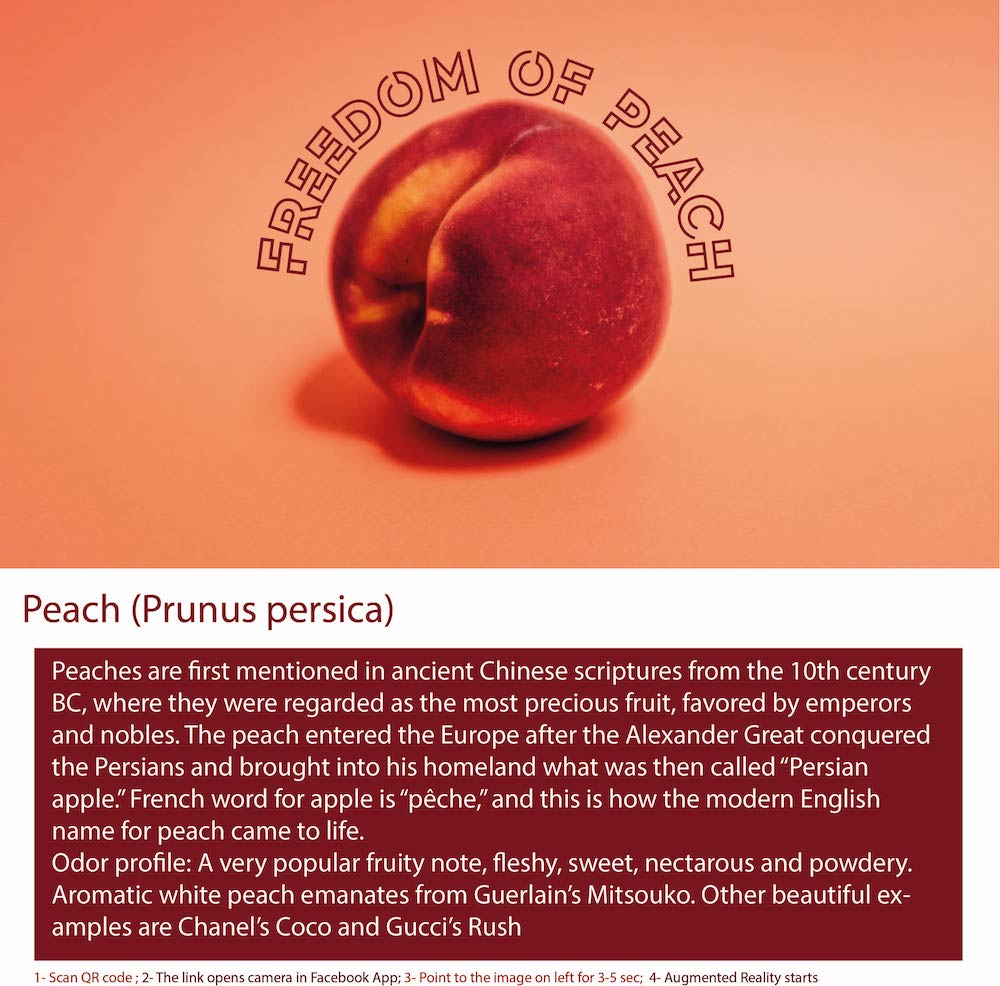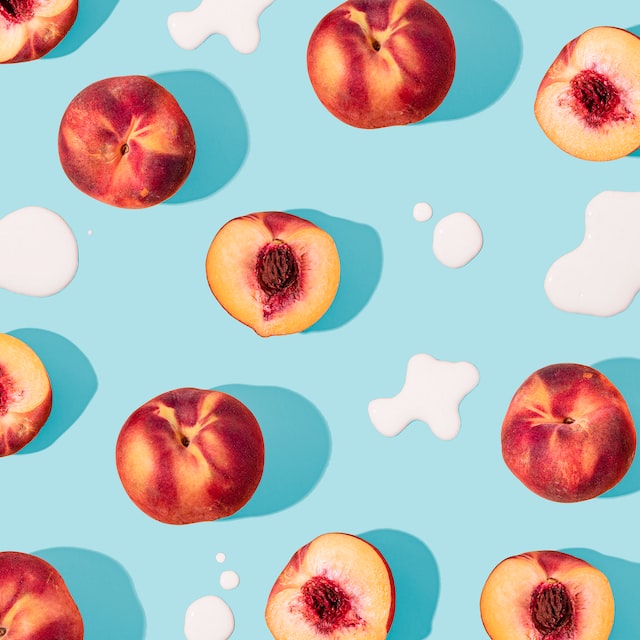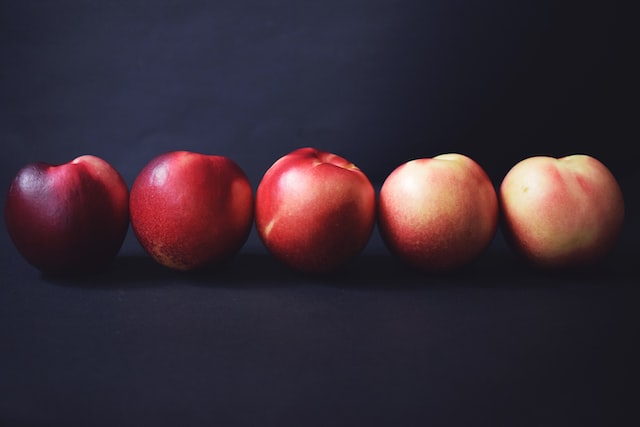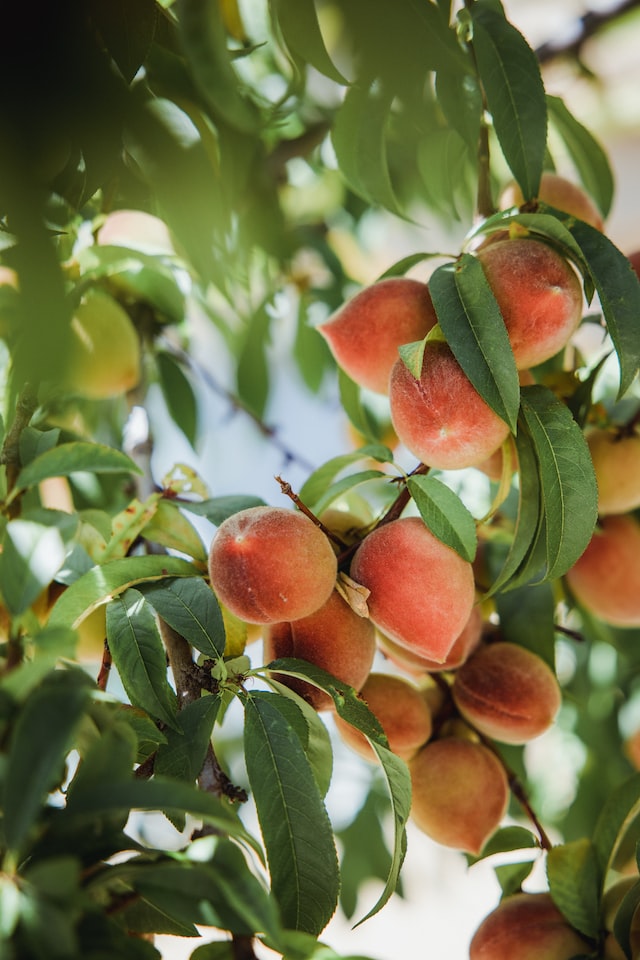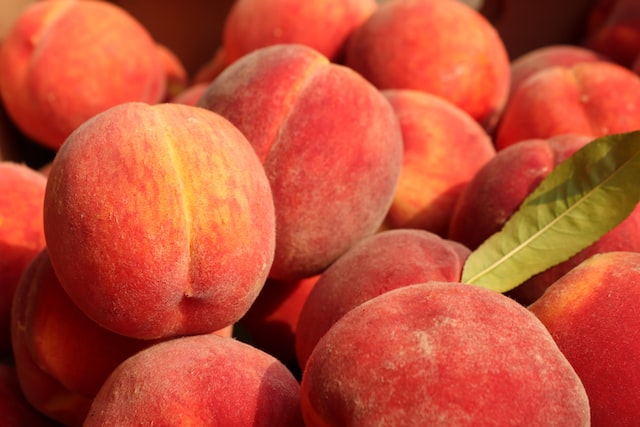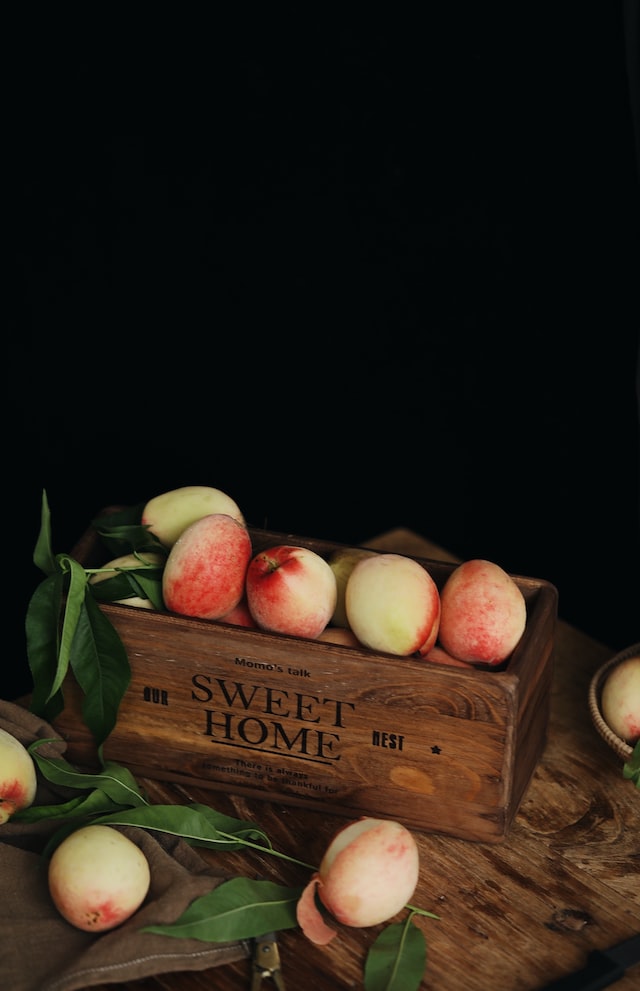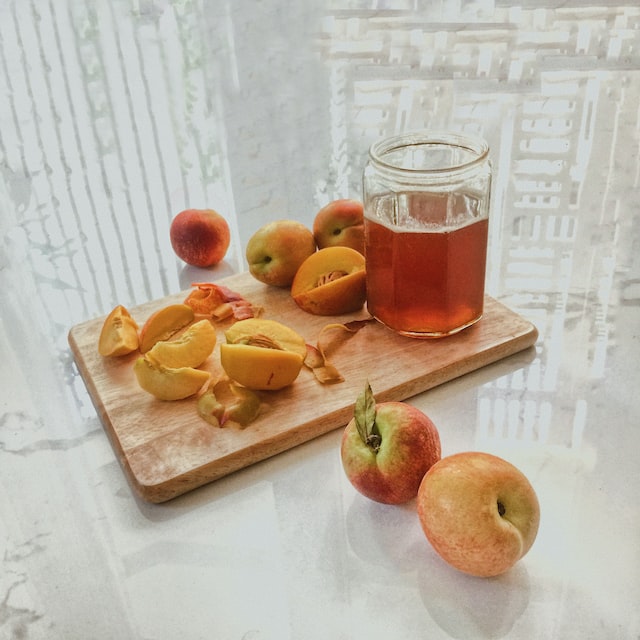Discover the Sweet Fruity Scent of Summer Peach at Scentopia Singapore
Peach: The Juicy Delight of Fragrance, Flavor, and Wellness
Introduction: Peach, with its juicy and sweet allure, is a delectable fruit cherished by people around the world. Scientifically known as Prunus persica, this luscious fruit belongs to the Rosaceae family and is celebrated for its delightful taste, fragrance, and potential therapeutic properties. From being a delicious ingredient in various culinary creations to inspiring perfumers with its delicate scent, peach is more than just a fruit. This essay delves into the captivating world of peach, encompassing its presence in perfumes, therapeutic oils, food, medicinal systems, historical significance, and intriguing fun facts about this extraordinary and beloved fruit.
Culinary Delights and Flavors: Peach is renowned for its sweet and juicy flavor, making it a beloved ingredient in various culinary delights. The fruit is enjoyed fresh, sliced in fruit salads, used in desserts like peach cobbler and peach pie, and incorporated into jams, sauces, and preserves. Its flavor is a delightful combination of sweetness and tanginess, making it a favorite fruit for both eating raw and cooking.
Perfumes and Fragrance: Peach is often used in perfumery to create delightful and fruity fragrances. The scent of peach is delicate, sweet, and evocative of summer days. It is often used in floral and fruity perfumes to add a touch of freshness and sweetness, making it a popular choice in the fragrance industry.
Therapeutic Oils and Aromatherapy: Peach essential oil is not commonly available, but certain therapeutic oils with fruity and uplifting characteristics, such as sweet orange or grapefruit essential oil, may be used in aromatherapy to promote a positive mood and reduce stress.
Medicinal Applications: Peach has been used in traditional medicine systems for its potential health benefits. The fruit is a good source of vitamins, minerals, and antioxidants, making it valuable for supporting overall health and well-being. Some traditional remedies use peach leaves and flowers for their potential anti-inflammatory and diuretic properties.
Historical Significance: Peach has a long history dating back to ancient China, where it was considered a symbol of immortality and prosperity. The fruit is believed to have originated in China and later spread to other parts of the world through trade routes. Peaches have been depicted in ancient art and literature and have been associated with various myths and legends.
Fun and Crazy Facts:
Peach, with its juicy and sweet allure, is a delightful and cherished fruit that continues to captivate people with its fragrance, flavor, and potential health benefits. From its presence in perfumes to its use in culinary delights and traditional medicine, peach offers a wealth of enjoyment and wellness. As we relish the succulent taste and fragrant essence of peach and explore its rich historical significance, we are reminded of the simple pleasures and wonders that nature provides and the enduring charm of this beloved fruit that has graced our tables and hearts for generations.
Introduction: Peach, with its juicy and sweet allure, is a delectable fruit cherished by people around the world. Scientifically known as Prunus persica, this luscious fruit belongs to the Rosaceae family and is celebrated for its delightful taste, fragrance, and potential therapeutic properties. From being a delicious ingredient in various culinary creations to inspiring perfumers with its delicate scent, peach is more than just a fruit. This essay delves into the captivating world of peach, encompassing its presence in perfumes, therapeutic oils, food, medicinal systems, historical significance, and intriguing fun facts about this extraordinary and beloved fruit.
Culinary Delights and Flavors: Peach is renowned for its sweet and juicy flavor, making it a beloved ingredient in various culinary delights. The fruit is enjoyed fresh, sliced in fruit salads, used in desserts like peach cobbler and peach pie, and incorporated into jams, sauces, and preserves. Its flavor is a delightful combination of sweetness and tanginess, making it a favorite fruit for both eating raw and cooking.
Perfumes and Fragrance: Peach is often used in perfumery to create delightful and fruity fragrances. The scent of peach is delicate, sweet, and evocative of summer days. It is often used in floral and fruity perfumes to add a touch of freshness and sweetness, making it a popular choice in the fragrance industry.
Therapeutic Oils and Aromatherapy: Peach essential oil is not commonly available, but certain therapeutic oils with fruity and uplifting characteristics, such as sweet orange or grapefruit essential oil, may be used in aromatherapy to promote a positive mood and reduce stress.
Medicinal Applications: Peach has been used in traditional medicine systems for its potential health benefits. The fruit is a good source of vitamins, minerals, and antioxidants, making it valuable for supporting overall health and well-being. Some traditional remedies use peach leaves and flowers for their potential anti-inflammatory and diuretic properties.
Historical Significance: Peach has a long history dating back to ancient China, where it was considered a symbol of immortality and prosperity. The fruit is believed to have originated in China and later spread to other parts of the world through trade routes. Peaches have been depicted in ancient art and literature and have been associated with various myths and legends.
Fun and Crazy Facts:
- Peach Varieties: There are hundreds of peach varieties, ranging in color from yellow to white to red. Each variety has its unique taste and characteristics.
- Georgia Peach: Georgia, a state in the United States, is famous for its peaches and is often referred to as the "Peach State."
- Peach Pit: The pit or stone inside the peach contains a seed that can be used to grow new peach trees.
- Canning Peaches: Canning peaches is a popular way to preserve the fruit's freshness and enjoy its flavor throughout the year.
- Peach Festival: Various regions around the world hold peach festivals to celebrate the harvest and the fruit's significance in local culture.
Peach, with its juicy and sweet allure, is a delightful and cherished fruit that continues to captivate people with its fragrance, flavor, and potential health benefits. From its presence in perfumes to its use in culinary delights and traditional medicine, peach offers a wealth of enjoyment and wellness. As we relish the succulent taste and fragrant essence of peach and explore its rich historical significance, we are reminded of the simple pleasures and wonders that nature provides and the enduring charm of this beloved fruit that has graced our tables and hearts for generations.
To experience augmented reality, please open the Facebook-app using QR code and point to the image below
Capturing the Essence of Summer
A peach is a species of fruit tree in the rose family, native to China and the region surrounding the Himalayas. The fruit, also called a peach, has a juicy flesh and a fuzzy skin. Peaches are commonly eaten fresh, but can also be canned or dried. They are a good source of vitamin C and potassium.
Peaches have been referenced in various forms of pop culture, including literature, music, and film.
In literature, the "peach" is often used as a symbol of temptation, as in the story of Adam and Eve in the Bible, where Eve is tempted by the serpent to eat the forbidden fruit of the tree of knowledge, which is often depicted as a peach. The novel "The Great Gatsby" by F. Scott Fitzgerald also features a scene where Gatsby shows off his lavish lifestyle to Daisy Buchanan by bringing her a plate of fresh peaches.
In music, the band The Presidents of the United States of America released a song called "Peaches" in 1995 which was a commercial success and became one of their most well-known songs.
In film, the movie "James and the Giant Peach" is a 1996 musical fantasy film directed by Henry Selick, based on the 1961 novel of the same name by Roald Dahl. The story is about a young orphan boy who enters a giant peach and has a wild and fantastic adventure with seven magically-altered garden bugs he meets.
In addition, Peach is also a character in the Super Mario series of video games.
Peaches have been referenced in various forms of pop culture, including literature, music, and film.
In literature, the "peach" is often used as a symbol of temptation, as in the story of Adam and Eve in the Bible, where Eve is tempted by the serpent to eat the forbidden fruit of the tree of knowledge, which is often depicted as a peach. The novel "The Great Gatsby" by F. Scott Fitzgerald also features a scene where Gatsby shows off his lavish lifestyle to Daisy Buchanan by bringing her a plate of fresh peaches.
In music, the band The Presidents of the United States of America released a song called "Peaches" in 1995 which was a commercial success and became one of their most well-known songs.
In film, the movie "James and the Giant Peach" is a 1996 musical fantasy film directed by Henry Selick, based on the 1961 novel of the same name by Roald Dahl. The story is about a young orphan boy who enters a giant peach and has a wild and fantastic adventure with seven magically-altered garden bugs he meets.
In addition, Peach is also a character in the Super Mario series of video games.
Exploring Our Sweet Fruity Fragrance Collection
Peaches have a long history and have been referenced in various forms of mythology throughout different cultures.
In Chinese mythology, the peach is often associated with immortality and is believed to have the power to ward off evil spirits. It is also considered a symbol of good luck and is often given as a gift to bring prosperity and longevity.
In Greek mythology, the goddess of spring, youth, and rebirth, Persephone, is said to have been tricked into eating six pomegranate seeds while in the underworld, which forced her to return there for six months of the year, causing the seasons. Some versions of the story, however, substitute pomegranate with seven peach pits, which also would have bound her to the underworld.
In ancient Rome, peaches were considered a luxury item and were often given as gifts to the ruling elite. The Roman naturalist Pliny the Elder wrote about peaches in his encyclopedic work "Naturalis Historia" in the 1st century AD, describing the different varieties and their cultivation.
Peaches were also cultivated in Persia and the Middle East for thousands of years. They were brought to the Americas by Spanish explorers in the 16th century and were later introduced to other parts of the world through European colonization.
In Chinese mythology, the peach is often associated with immortality and is believed to have the power to ward off evil spirits. It is also considered a symbol of good luck and is often given as a gift to bring prosperity and longevity.
In Greek mythology, the goddess of spring, youth, and rebirth, Persephone, is said to have been tricked into eating six pomegranate seeds while in the underworld, which forced her to return there for six months of the year, causing the seasons. Some versions of the story, however, substitute pomegranate with seven peach pits, which also would have bound her to the underworld.
In ancient Rome, peaches were considered a luxury item and were often given as gifts to the ruling elite. The Roman naturalist Pliny the Elder wrote about peaches in his encyclopedic work "Naturalis Historia" in the 1st century AD, describing the different varieties and their cultivation.
Peaches were also cultivated in Persia and the Middle East for thousands of years. They were brought to the Americas by Spanish explorers in the 16th century and were later introduced to other parts of the world through European colonization.
Unleash the Power of Natural Fruit Scents
Peaches have been a popular subject in art throughout history, appearing in paintings, sculptures, and other forms of visual art.
In Chinese art, peaches are often depicted in paintings and sculptures as symbols of longevity and immortality. They are also a common motif in Chinese ceramics and are often depicted in intricate designs on porcelain vases and plates.
In Japanese art, peaches are often associated with the Tengu, a type of supernatural creature from Japanese folklore. Tengu are often depicted holding a peach or with a peach in their hand, as the peach is believed to be a symbol of their immortality.
In European art, peaches were often depicted in still life paintings, particularly during the Baroque period. The Dutch master Jan van Huysum was particularly known for his paintings of flowers and fruit, including peaches. In these paintings, peaches were often used to symbolize the fleeting nature of beauty and the transience of life.
In addition, the symbol of the peach is also present in the traditional Chinese art of paper-cutting, where it is considered a symbol of good luck and prosperity.
In modern art, peaches have been used as a symbol of sensuality and eroticism, and also as a representation of the female body.
In Chinese art, peaches are often depicted in paintings and sculptures as symbols of longevity and immortality. They are also a common motif in Chinese ceramics and are often depicted in intricate designs on porcelain vases and plates.
In Japanese art, peaches are often associated with the Tengu, a type of supernatural creature from Japanese folklore. Tengu are often depicted holding a peach or with a peach in their hand, as the peach is believed to be a symbol of their immortality.
In European art, peaches were often depicted in still life paintings, particularly during the Baroque period. The Dutch master Jan van Huysum was particularly known for his paintings of flowers and fruit, including peaches. In these paintings, peaches were often used to symbolize the fleeting nature of beauty and the transience of life.
In addition, the symbol of the peach is also present in the traditional Chinese art of paper-cutting, where it is considered a symbol of good luck and prosperity.
In modern art, peaches have been used as a symbol of sensuality and eroticism, and also as a representation of the female body.
Peach fun facts
- The scientific name for peach is Prunus persica, and it is a member of the rose family.
- Peaches are believed to have originated in China, where they have been cultivated for over 4,000 years.
- Peaches are a good source of Vitamin A, Vitamin C, and potassium.
- The fuzzy skin of a peach is actually a type of hair called trichomes, which protect the fruit from pests and UV radiation.
- Peaches come in many varieties, including yellow-flesh, white-flesh and donut peaches, each with its own unique flavor and texture.
- Peaches were considered a symbol of love and good fortune in ancient China, and were often given as gifts to newlyweds.
- Peaches were brought to the Americas by Spanish explorers in the 16th century, and today the United States is one of the largest producers of peaches in the world.
- The largest peach cobbler ever made weighed over 3,700 pounds and was cooked in a giant skillet measuring 12 feet wide and 4 feet deep.
- The peach is the official state fruit of Georgia, USA.
- In Japan, the peach is a symbol of longevity and is often given as a gift to the elderly.
- The peach is also used in traditional Chinese medicine to help with digestion, and to strengthen the spleen and stomach.
Experience the Refreshing Aroma of Peaches
Peach is a popular scent note in aroma therapy and is believed to have several benefits when used in essential oils or other scented products.
- Peach scent is believed to promote feelings of happiness and contentment, making it a popular choice for use in relaxation and stress-relief products.
- The scent of peach is also thought to have a calming effect on the mind and body, making it useful for promoting sleep and reducing anxiety.
- Peach scent is also believed to have an aphrodisiac effect, making it a popular choice for use in massage oils and other romantic products.
- Peach scent is also believed to have skin-loving properties, as it is known to hydrate and nourish the skin, making it a popular ingredient in lotions and skin care products.
- In addition, peach scent is also used in some cleaning and freshener product as well, it gives a fresh and fruity aroma to the environment.
Crafted with Care: Our Sweet Fruity Scent Collection
Here is a list of some perfume brands that have peach as a note in their fragrance:
- Marc Jacobs Daisy Eau So Fresh
- Yves Saint Laurent Black Opium Nuit Blanche
- Gucci Guilty Love Edition Pour Femme
- Versace Eros Pour Femme
- Prada Candy L'Eau
- Dior J'Adore L'Or
- Thierry Mugler Alien
- Chloé Love Story
- Lancôme La vie est belle L'Eclat
- Burberry My Burberry Blush
- Givenchy Live Irresistible Blossom Crush
- Dolce & Gabbana Light Blue Eau Intense
- Jo Malone Peony & Blush Suede
- Kenzo Amour
- Ralph Lauren Romance
- Tom Ford White Suede
- Yves Rocher So Elixir Purple
- Paco Rabanne Lady Million Prive
Bringing the Outdoors In: Peachy Aromatic Delights
Join Scentopia, Sentosa's latest tourist attraction wonderful orchid scent crafting, fragrance tour, bridal shower or corporate team building which includes perfume making onsite and offsite, beach activities and more. We also serve primary school learning journey, secondary students and pupil on industrial excursions. Know more about our orchids perfume bar or therapeutic orchid scents and other wellness aromas. Conatct Perfume workshop or book a scent crafting session here.

